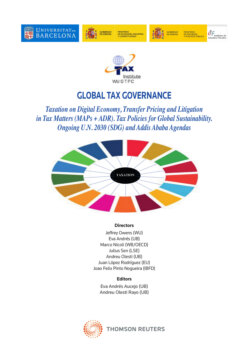Читать книгу Global Tax Governance. Taxation on Digital Economy, Transfer Pricing and Litigation in Tax Matters (MAPs + ADR) Policies for Global Sustainability. Ongoing U.N. 2030 (SDG) and Addis Ababa Agendas - Jeffrey Owens - Страница 32
На сайте Литреса книга снята с продажи.
TOMORROW: DIGITAL COOPERATIVE COMPLIANCE
ОглавлениеThe concept of co-operative compliance emerged from the OECD’s Forum of Tax Administration (FTA) in 201343 as a follow on from a 2008 Study into the Role of Tax Intermediaries. It reinforced seven pillars of good design and introduced a systematic approach to tax risk as established in tax control frameworks of multinational enterprises, the taxpayer segment for which cooperative compliance was targeted.
A separate concept targeted at small and medium businesses was illustrated in an OECD report from 2014 entitled Tax Compliance by Design.44 It provided two paths to enhanced compliance with one focusing on centralized data collection to check against voluntary compliance reporting and another that relies upon a secured chain of trusted systems to provide trusted results.
As discussed above, what we have seen is a predominance of tax system designs going down the path of the centralized data collection over these past years. This might be in part based upon the 2014 description of secured chains requiring manual auditing and monitoring, a time consuming and highly specialized process for tax administrators and/or retained third parties.
Despite the predominance of centralized data collection today, it may be that the secured chain approach proves a more lasting solution in the future. That certainly appears to be the theme reflected in the recent FTA publication entitled Tax Administration 3.0: The Digital Transformation of Tax Administration.45 The document argues efforts focused on refining and strengthening the existing methods, which rely upon voluntary compliance, are reaching their limits. Given the evolving digital economy these efforts are insufficient and raise compliance costs so will be unable put a dent in the still significant tax gap. It argues we need to consider what is now possible by reimagining the taxation process using modern digital technologies and skills.
The report discussed embedding the capacity for taxation within taxpayer natural systems as part of a resilient “system of systems” that provides real time tax certainty in a manner that is transparent and trustworthy and is integrated with other government services. This could potentially remove the data privacy and security risks associated with large pools of taxpayer data from e-invoicing and other methods. Key to this vision is the use of artificial intelligence at various points, to make the decisions instead of requiring human intervention. In the few cases when they are needed, human decisions are supported with AI enhanced analytics.
The report indicates that payroll and indirect taxation, being applied at the transaction level, are clearly the easiest taxes to which to apply these methods. As opposed to tradition co-operative compliance, which is focused only on multinational enterprises, the concept is discussed as being applicable to businesses of all sizes, not just multinationals. Finally, the report illustrates scenarios of the future which are user experience-oriented visions that help bring the concepts to life for the reader.
Considering this forward thinking and the machine learning and blockchain discussions above, we can perhaps define the future along two different paths, that of continued collection of ever larger datasets with matching and risk scoring algorithms running on top resulting in traditional audits, or that of a continuously monitored secured chain of custody of systems and algorithms with remote audit and inquiry enabled. In the latter case the onus shifts from protecting data, ensuring only appropriate access, to protecting the algorithm and specifically proof of its unmodified use. Interestingly, the algorithm itself can be freely shared or even open sourced as protection in this case does not mean securing from access but rather securing how proof of use occurs.
Forks in the Road for Tax Compliance in a Digital EconomyIllustration 2
